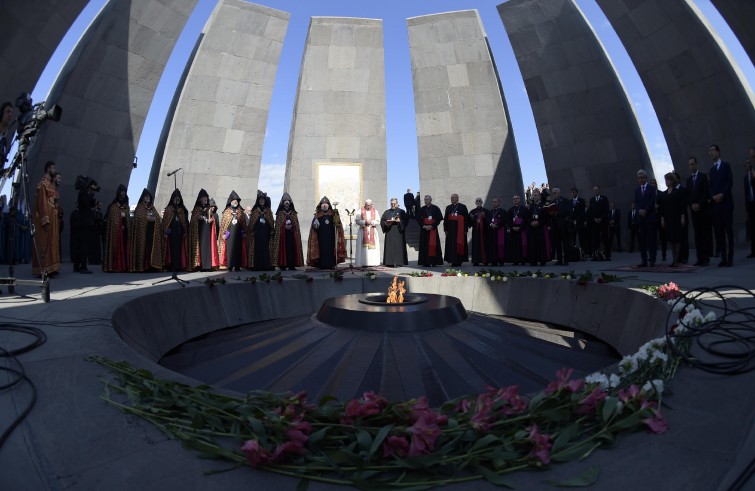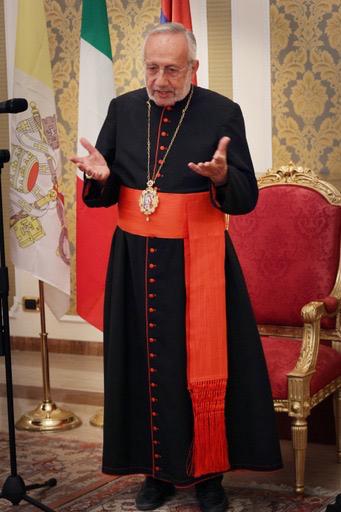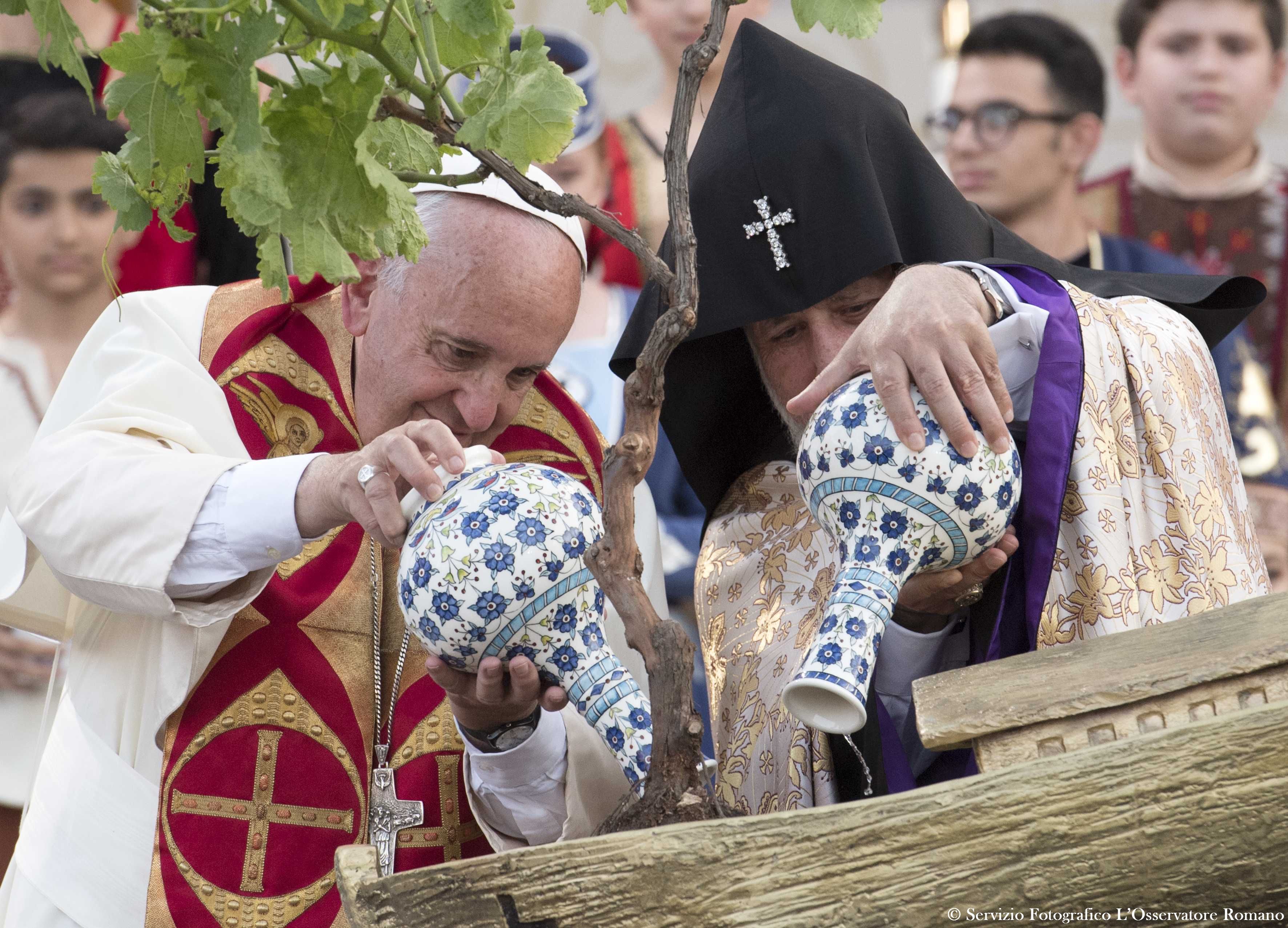
“It’s true that it was an attempt at extermination; it’s true that one and a half million people were martyred for their Christian faith; it’s true that they were forcibly deported to the deserts of Syria, where they were killed in ambushes, hungry, thirsty, mothers, children and babies. They were truly victims of this wickedness. And yet they were like an olive tree which, when it is old, allows a new tree to grow from its roots and bear fruit, fresh and tasty fruit.” His Beatitude Raphael Bedros XXI Minassian, Patriarch of Cilicia of the Armenian Catholics, addresses young people in a message released on 24 April, the day when Armenians in their homeland and in the Diaspora commemorate the martyrs of the Armenian Genocide. “After the horrors and misery of the Genocide of 1915, you are the new generation, the children and grandchildren of the martyrs,” reads the message. “You represent rebirth and development. The experiences of the past have made you stronger and wiser. You are the ones who will face future challenges with greater awareness and determination.”
 The extermination of the Armenian population is one of the greatest and least known of the numerous tragedies of the First World War. It was a massacre of enormous proportions, forgotten for decades. Armenians were deported and killed in massacres carried out between 1915 and 1916, leaving around 1.5 million dead. During his visit to Armenia in June 2016, Pope Francis visited the Memorial of the Metz Yeghern, the ‘Great Evil’, (as it is known in Armenian), located on the hill of Tzitzernakaberd, the ‘Swallow’s Fortress’, overlooking Yerevan – becoming the first Pope to call the Armenian slaughter ‘Genocide’. Here, after laying flowers in the centre of the circular mausoleum where the ‘eternal flame’ burns, the Pope paused to pray for the victims of the massacre.
The extermination of the Armenian population is one of the greatest and least known of the numerous tragedies of the First World War. It was a massacre of enormous proportions, forgotten for decades. Armenians were deported and killed in massacres carried out between 1915 and 1916, leaving around 1.5 million dead. During his visit to Armenia in June 2016, Pope Francis visited the Memorial of the Metz Yeghern, the ‘Great Evil’, (as it is known in Armenian), located on the hill of Tzitzernakaberd, the ‘Swallow’s Fortress’, overlooking Yerevan – becoming the first Pope to call the Armenian slaughter ‘Genocide’. Here, after laying flowers in the centre of the circular mausoleum where the ‘eternal flame’ burns, the Pope paused to pray for the victims of the massacre.
 Today, the Armenian Catholic Church turns its gaze to the future and to young people. “You will continue to offer the best of yourselves with a renewed Christian spirit of faith, like the olive trees that continue to bear fruit,” writes Minassian. “You will grow strong roots, confident and resilient. You are the new tree, the young generation that will stand up to all the persecutions and problems of life.” “The younger generation today has the power to break the cycle of violence and injustice, to spread the love and compassion of Christ in an often chaotic and ruthless world. The younger generations have the power to be a beacon of Christian faith shining in the darkness, sustaining hope for those who are oppressed and deprived of their rights.” In his message, the Patriarch mentions two exemplary figures for young people: Blessed Maloyan, who “bore witness to Jesus through the shedding of his blood and his life”, and Card. Gregory Agagianian, a servant of God who was saved from the genocide. “Be proud of these models and follow their example. We must open our hearts to hope in God in the face of adversity, inexplicable evil and a tragic history of violence and bloodshed. Hope in God is our national banner. Do not mourn for the past. Remember it always, so that it will never happen again. Do not weep for our sacrifices, for they were offered out of love for God; on the contrary, be proud to belong to an Armenian Christian identity that no violence can take away from you. Be proud because despite the massacre, we are still here today and we have a motherland, Hayastan.
Today, the Armenian Catholic Church turns its gaze to the future and to young people. “You will continue to offer the best of yourselves with a renewed Christian spirit of faith, like the olive trees that continue to bear fruit,” writes Minassian. “You will grow strong roots, confident and resilient. You are the new tree, the young generation that will stand up to all the persecutions and problems of life.” “The younger generation today has the power to break the cycle of violence and injustice, to spread the love and compassion of Christ in an often chaotic and ruthless world. The younger generations have the power to be a beacon of Christian faith shining in the darkness, sustaining hope for those who are oppressed and deprived of their rights.” In his message, the Patriarch mentions two exemplary figures for young people: Blessed Maloyan, who “bore witness to Jesus through the shedding of his blood and his life”, and Card. Gregory Agagianian, a servant of God who was saved from the genocide. “Be proud of these models and follow their example. We must open our hearts to hope in God in the face of adversity, inexplicable evil and a tragic history of violence and bloodshed. Hope in God is our national banner. Do not mourn for the past. Remember it always, so that it will never happen again. Do not weep for our sacrifices, for they were offered out of love for God; on the contrary, be proud to belong to an Armenian Christian identity that no violence can take away from you. Be proud because despite the massacre, we are still here today and we have a motherland, Hayastan.








